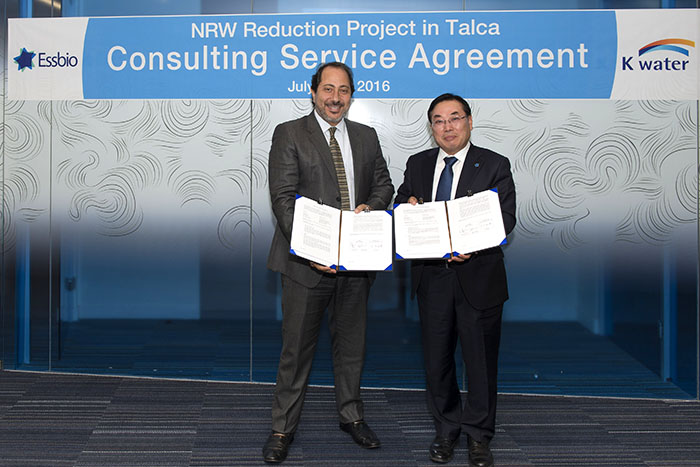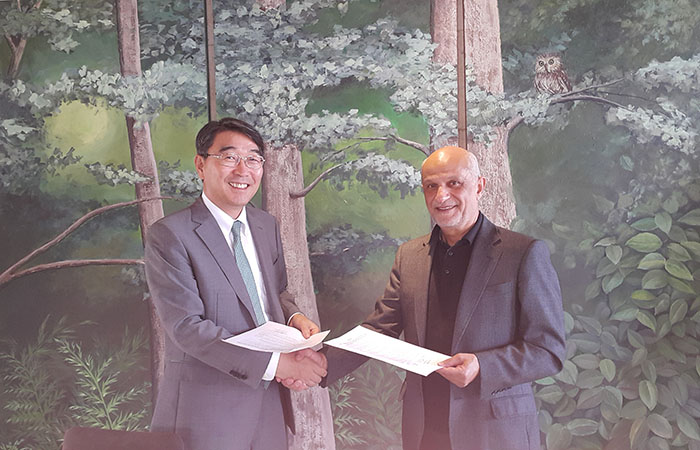-
 Korea.net's 24-hour YouTube channel
Korea.net's 24-hour YouTube channel- NEWS FOCUS
- ABOUT KOREA
- EVENTS
- RESOURCES
- GOVERNMENT
- ABOUT US

Eduardo Abuauad (left), CEO of Essbio, and Lee Jin Ho, director of waterworks at the Korean Water Resources Corporation, pose for a photo on July 20 after signing an agreement on a non-revenue water (NRW) reduction project in Talca, Chile.
Korea's water resource management technology will soon be put to use in Chile and Iran.
On July 20, the Korea Water Resources Corporation (KWRC) signed a deal worth USD 150,000 with Essbio, a privately owned Chilean water utility. The consulting services agreement outlines a six-month plan for a non-revenue water reduction project in Talca, Chile.
Non-revenue water (NRW) refers to filtered tap water that is lost before it reaches the customer. It is typically measured as the volume of water "lost" as a share of the net water provided. While Chile has a relatively large water supply, its NRW rate is on average around 66.3 percent due to poor water utility management and infrastructure. In the case of the city of Talca, certain areas have NRW rates that barely reach 37.9 percent.
To address this pressing issue, the KWRC will provide water utility consulting services to the city of Talca over the next six months, and set up management systems for the city's non-revenue water flow rate. The goal is to raise the current rate by 10 percentage points during the contract period.

Yoon Seok-won (left), head of the water business group at Doosan Heavy Industries, and Reza Haddadian, chairman of Sazeh Sazan, pose for a photo after signing a KRW 220 billion contract in Tehran on June 27.
Meanwhile, on June 27 Doosan Heavy Industries won a KRW 220 billion (approximately USD 183 million) contract with Sazeh Sazan, a private Iranian company, to build a desalinization plant in Iran.
The facility, to be built in Bandar Abbas in the southern province of Hormozgan, will turn sea water into fresh water through reverse osmosis, for use in the region's mines. Once completed, around 200,000 tons of fresh water, enough for some 670,000 people to use at the same time, will be produced on a daily basis.
Doosan Heavy Industries will oversee the construction, provide equipment, as well as maintenance and support, for the duration of the contract. The plant is expected to be completed by October 2018. The company will then operate the plan through 2030 on behalf of Sazeh Sazan.
By Lee Hana
Korea.net Staff Writer
Photos: Korea Water Resources Corporation, Doosan Heavy Industries
hlee10@korea.kr
Most popular
- First hearing-impaired K-pop act hopes for 'barrier-free world'
- 'Mad Max' director impressed by 'cinema-literate' Korean viewers
- Romanian presidential couple visits national cemetery
- 'Korean mythology is just as wonderful as Greek and Roman'
- Hit drama 'Beef' wins awards from 3 major Hollywood guilds













